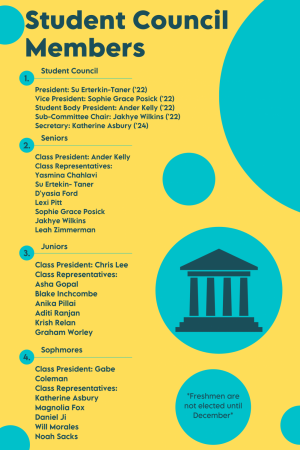Scholarship Survival Guide: Vagenas advises students on college scholarships
May 11, 2022
Most students hear about scholarships all the time in high school, mostly from the morning announcements. But until junior year, they seem abstract and distant from their daily existence, like a speck on the horizon. And yet, they can prove vital to students reaching their college goals.
For example, Director of College Counseling Ms. Vagenas shared a story about a Bolles student who wanted to major in journalism at the University of Miami. While the university had not offered enough financial aid for her to attend, she won the prestigious Gates Scholarship. Founded by the Bill and Melinda Gates Foundation in 2017, this award promises to fully fund 300 students per year to study at a college or university of their choice.
“We all had many tears,” Vagenas said. “The student, me, her mom, because that meant she got to choose her first choice, which was Miami. Because regardless of the dollar amount that was not being covered, Gates picked up everything that was left.”
Other high-value scholarships include the Morehead-Cain Scholarship at the University of North Carolina at Chapel Hill and the Jefferson Scholarship at the University of Virginia. To be competitive for these awards, students need a strong academic record, leadership experience, and community involvement, as well as a nomination. To win the school’s nomination, students must apply and interview with a committee of faculty members and administrators.
However, students without Bolles’ nomination can self-nominate. Dollar values for scholarships can range from “that extreme to a couple of hundred dollars,” she added. “You know, and every little bit counts.”
In order for these amounts to add up, Vagenas advises students to start their scholarship search early. The two main resources she recommends are CollegeBoard’s BigFuture and Fastweb, a website that functions as a specialized search engine for scholarships.
Additionally, seniors have access to a database of scholarship opportunities deemed by the college counseling department to be most applicable to Bolles seniors. Since sophomores and juniors do not have access to that database, scholarships available to them are often posted in the daily announcements.
Furthermore, Vagenas encourages students to look for scholarships in places that may seem unlikely. For instance, she once had a student who won a scholarship from Jiffy Lube for writing an essay about his favorite road trip, and another who was awarded a scholarship for being left-handed.
Others find their niche with departmental scholarships, which are often awarded to returning students in certain majors. “Just because you didn’t earn scholarship money as an incoming freshman doesn’t mean there won’t be additional opportunities to pursue moving forward,” she said, stressing that scholarship opportunities do not evaporate after matriculation. “So you’ve declared a major. If you are a history major, the history department may offer some scholarships.”
However, scholarships are not simply free money. “It’s a lot of homework, Vagenas said. “It takes a lot of time to do the research, and so you have to dedicate yourself to it.”
But, she added, this workload is diminished by careful planning and getting an early start, “so even if a student is a 10th grader, but they’re keeping a running list, by the time they get to summer before senior year, they can kind of go back to that list and then check the most updated information.”
While college counseling is a helpful resource, Vangenas still recommends students seek out information about scholarships for themselves due to the lack of universal answers, saying, The first part of every answer about scholarships, admission, or almost anything is ‘it depends.’”






